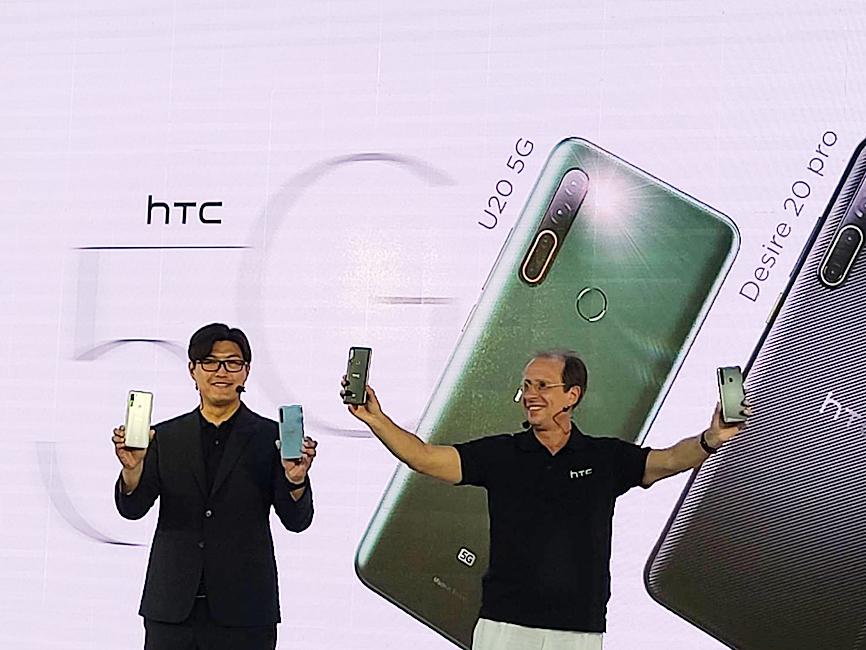HTC Corp (宏達電) yesterday reported revenue of NT$430 million (US$14.89 million) for last month, down 47 percent from NT$817 million in September and 34 percent from NT$656 million a year earlier.
Revenue in the first 10 months of the year plunged 47.7 percent to NT$4.64 billion from the same period last year.
HTC has been moving into virtual reality, forming a strategic partnership with Valve Corp in 2015 in hopes of reviving its fortunes.

Photo: Wang Yi-hung, Taipei Times
However, its VR efforts have yet to bear fruit and the company continues to rely heavily on mobile phones to drive its business.
The release of the HTC U20 5G in September gave the company its best month this year, with revenue soaring 88 percent to NT$817 million from August, but still declining 35.9 percent from a year earlier.
Priced at NT$18,990, it was relatively affordable compared with other 5G handsets.
On Oct. 20, HTC launched the 4G HTC Desire 20+, a mid-range model priced at NT$8,940.
This month, it made the U20 5G available in black.
Wistron Corp (緯創), an iPhone assembler, announced that revenue last month rose 4.5 percent sequentially to NT$92.1 billion, but declined 9.7 percent from a year earlier.
For the first 10 months, revenue slid 3.3 percent year-on-year to NT$684.7 billion.
Contract electronics manufacturer Inventec Corp (英業達) also saw revenue last month fall 18.9 percent month-on-month and 12.6 percent year-on-year to NT$42.1 billion.
The company said that it was hampered by supply shortages for its laptop and server products, leading to lower production.
However, revenue in the first 10 months edged up 1.3 percent from a year earlier to NT$424.9 billion, it said..

TECH CLUSTER: The US company’s new office is in the Shalun Smart Green Energy Science City, a new AI industry base and cybersecurity hub in southern Taiwan US chip designer Advanced Micro Devices Inc (AMD) yesterday launched an office in Tainan’s Gueiren District (歸仁), marking a significant milestone in the development of southern Taiwan’s artificial intelligence (AI) industry, the Tainan City Government said in a statement. AMD Taiwan general manager Vincent Chern (陳民皓) presided over the opening ceremony for the company’s new office at the Shalun Smart Green Energy Science City (沙崙智慧綠能科學城), a new AI industry base and cybersecurity hub in southern Taiwan. Facilities in the new office include an information processing center, and a research and development (R&D) center, the Tainan Economic Development Bureau said. The Ministry

ADVERSARIES: The new list includes 11 entities in China and one in Taiwan, which is a local branch of Chinese cloud computing firm Inspur Group The US added dozens of entities to a trade blacklist on Tuesday, the US Department of Commerce said, in part to disrupt Beijing’s artificial intelligence (AI) and advanced computing capabilities. The action affects 80 entities from countries including China, the United Arab Emirates and Iran, with the commerce department citing their “activities contrary to US national security and foreign policy.” Those added to the “entity list” are restricted from obtaining US items and technologies without government authorization. “We will not allow adversaries to exploit American technology to bolster their own militaries and threaten American lives,” US Secretary of Commerce Howard Lutnick said. The entities

Minister of Finance Chuang Tsui-yun (莊翠雲) yesterday told lawmakers that she “would not speculate,” but a “response plan” has been prepared in case Taiwan is targeted by US President Donald Trump’s reciprocal tariffs, which are to be announced on Wednesday next week. The Trump administration, including US Secretary of the Treasury Scott Bessent, has said that much of the proposed reciprocal tariffs would focus on the 15 countries that have the highest trade surpluses with the US. Bessent has referred to those countries as the “dirty 15,” but has not named them. Last year, Taiwan’s US$73.9 billion trade surplus with the US

The Taipei International Cycle Show (Taipei Cycle) yesterday opened at the Taipei Nangang Exhibition Center, with the event’s organizer expecting a steady recovery in the industry this year following a tough last year. This year, 980 companies from 35 countries are participating in the annual bicycle trade show, showcasing technological breakthroughs and market development trends of the bicycle industry at 3,600 booths, the Taiwan External Trade Development Council (TAITRA, 外貿協會) said in a statement. Under the theme “Ride the Revolution,” the exhibition has attracted more than 3,500 international buyers from 80 countries to preregister for the four-day event, which is expected to